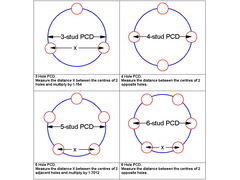...mind you, playing with a dividing head/rotary table is SO much more fun than a pair of boring old dividers!

David

I want to make a trim piece for the centre of my steering wheel. To do this I need to drill 6 holes to match the wheel's existing holes.
I don't want to drill through the wheel's holes, as the spokes are polished and likely to get scratched. I also need to be sure of the
centre's location as I'll be turning the piece in my lathe, and I cant get that from the wheel.
Is there a set technique for finding the PCD of a circle of holes? I have a digital vernier caliper, so I can take accurate measurements.
cheers,
David
A Zeus book will give you the co-ordinates for hole centres for jig boring, i dont know if this will help.
What about making a template out of ply wood. Stg wheel on top, mark out the holes etc.
Can you measure to the outside of two opposite holes and then subtract one hole diameter? Same as measuring to the inside of two opposite holes and
adding one hole diameter assuming the holes are same diameter of course). This method will only work if the holes are dead opposite.
Easy if you have a vernier....just do as Darren suggests...
Measure the distance from the outside of opposite holes. Then subtract the diameter of one of the holes, thats the PCD....
David
The vernier calipers will easily tell you the pcd, but drilling the holes on that pcd is a touch trickier.
A dividing head or just a rotary table will make the job much easier. If you don't have one then i'd probably scribe a line at the pcd by
touching onto it with a sharp lathe tool while the hub is still in the lathe. Then after taking the hub out of the lathe, go round it with dividers
to get the hole centres.
I really really want a rotary table!!!!!!!!!!!!!!!!
If you dont have opposing holes but they are equally spaced there is a mathematical method if you want I can explain but I've just lost it once in my browser and cannae be arsed doing it again unless you actually need it!
Getting 6 equi-distant centre marks on the PCD is the easy bit!
Dot the centre point, and make a circle of PCD/2 using dividers. Dot a point on the circle, then use the dividers without changing the setting
to divide the circumference into 6.
With care this method is very accurate.
BTW: the 6 holes are equidistant round the PCD.
cheers,
David
cheers for that, will have a divider play when I get home.
You're sorted then!
Reckon so...
...mind you, playing with a dividing head/rotary table is SO much more fun than a pair of boring old dividers!

David
An ammendment to Darrens suggestion with your set up is to zero the digital verniers at the hole diameter then just measure the outside distance between two opposing holes.
quote:
Originally posted by David Jenkins
Reckon so...
...mind you, playing with a dividing head/rotary table is SO much more fun than a pair of boring old dividers!

David
As said above this infromation is in a ZEUS BOOK
ahhh, mybe so but I don't have one!
( I know I should but I don't!)
I found this, which saves me looking it up in some table or other:


Rescued attachment PCD_01.jpg
quote:
Originally posted by mad4x4
As said above this infromation is in a ZEUS BOOK
That's the conclusion that I had come to as well!
I'm looking on ebay for a rotary table now!